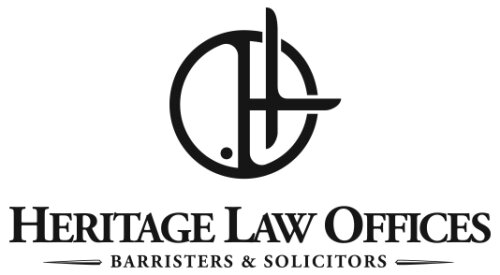Best Animal Law Lawyers in Edmonton
Share your needs with us, get contacted by law firms.
Free. Takes 2 min.
List of the best lawyers in Edmonton, Canada
About Animal Law in Edmonton, Canada
Animal Law in Edmonton, Canada, is a specialized area of law that encompasses legal issues affecting animals. It focuses on the legal protections afforded to animals, the responsibilities of animal owners, and the regulations governing animals in various contexts. These laws strive to balance the welfare of animals and their humane treatment with the rights and responsibilities of individuals and organizations that interact with animals. This area of law frequently intersects with other legal fields such as property law, criminal law, and environmental law.
Why You May Need a Lawyer
There are several situations where individuals or organizations may require legal assistance in the field of Animal Law. Common examples include:
- Disputes between neighbors related to pets, such as noise complaints or property damage.
- Issues related to animal cruelty or neglect, whether defending against allegations or pursuing action against perceived mistreatment.
- Regulatory compliance for businesses such as pet stores, veterinary practices, or animal shelters.
- Guidance on the importation or exportation of animals.
- Estate planning that involves pets, ensuring they are cared for according to your wishes after you pass away.
- Challenges related to owning exotic pets or farm animals within city limits.
Local Laws Overview
Animal Law in Edmonton is primarily governed by municipal bylaws and provincial legislation, with some federal regulations also applying. Key aspects include:
- The Animal Protection Act of Alberta which sets out standards for the treatment and care of animals, prohibiting abuse and neglect.
- The City of Edmonton’s Animal Licensing and Control Bylaw which outlines requirements for licensing pets, regulations on pets in public spaces, and limits on the number of pets within a household.
- Legislation related to wildlife and endangered species which impacts how such animals can be interacted with and are protected within Alberta.
- Province-wide regulations concerning veterinary practices and standards of care.
Frequently Asked Questions
1. What are the penalties for animal cruelty in Edmonton?
Penalties for animal cruelty can include fines, imprisonment, and bans on owning animals. The severity of the penalty depends on the nature and severity of the offense.
2. Do I need a license for my dog or cat in Edmonton?
Yes, all dogs and cats over the age of six months must be licensed with the City of Edmonton. This helps ensure pets can be returned to their owners if lost and assists in funding local animal services.
3. Are there any restrictions on owning exotic pets in Edmonton?
Yes, the City of Edmonton has bylaws that restrict the ownership of certain exotic animals deemed dangerous or not suitable as pets. Details can be found in the local bylaws or by contacting the municipal authorities.
4. How can I report suspected animal abuse?
Suspected animal abuse can be reported to the Edmonton Humane Society or local law enforcement. They will investigate and take appropriate action if necessary.
5. What should I do if a dog bites me?
If a dog bites you, it's important to seek medical attention immediately. Report the incident to Edmonton Animal Care & Control and, if necessary, contact a lawyer to discuss any legal actions you can take.
6. Can I leave money for the care of my pets in my will?
Yes, you can include provisions in your will to ensure your pets are taken care of after your death. This often involves leaving funds to a designated caregiver.
7. What are the noise regulations related to pets in Edmonton?
Edmonton bylaws prohibit pets from making unreasonable noise or being a nuisance to neighbors, especially during nighttime hours. Persistent issues may involve mediation or legal action.
8. Are there leash laws I need to be aware of?
Yes, Edmonton requires dogs to be on a leash in public places unless in designated off-leash areas. This is for the safety of the public, the pet, and other animals.
9. What should I do if I find an injured wild animal?
If you find an injured wild animal, contact a local wildlife rehabilitation center or the City of Edmonton for guidance. Handling wild animals on your own can be dangerous and is generally discouraged.
10. Can animals be included as part of a divorce settlement?
Yes, pets can be included as part of a divorce settlement. They are often regarded as property and may be assigned to one party, or arrangements for shared custody can be made.
Additional Resources
Those seeking further information or assistance in Animal Law in Edmonton can reach out to the following resources:
- Edmonton Humane Society: Offers services for animal welfare and legislative guidance.
- Alberta SPCA: Provides information and reporting services for animal protection.
- Alberta Society For the Prevention of Cruelty to Animals: Enforces animal protection laws across Alberta.
- City of Edmonton Animal Care & Control Centre: Manages lost and found pets, licenses, and animal-related complaints.
- Local Law Firms Specializing in Animal Law: Can offer legal advice and representation for specific legal issues.
Next Steps
If you need legal assistance in Animal Law within Edmonton, the following steps are recommended:
- Document any incidents or issues involving animals with dates, times, and photographic evidence if possible.
- Research your rights and responsibilities under local animal laws and bylaws.
- Consult with a lawyer who specializes in Animal Law to understand your legal position and options.
- Contact relevant authorities if there is a need for immediate intervention (e.g., suspected cruelty or dangerous animal behavior).
- Consider mediation or legal representation if the issue escalates and cannot be resolved through communication or negotiation.
Lawzana helps you find the best lawyers and law firms in Edmonton through a curated and pre-screened list of qualified legal professionals. Our platform offers rankings and detailed profiles of attorneys and law firms, allowing you to compare based on practice areas, including Animal Law, experience, and client feedback.
Each profile includes a description of the firm's areas of practice, client reviews, team members and partners, year of establishment, spoken languages, office locations, contact information, social media presence, and any published articles or resources. Most firms on our platform speak English and are experienced in both local and international legal matters.
Get a quote from top-rated law firms in Edmonton, Canada — quickly, securely, and without unnecessary hassle.
Disclaimer:
The information provided on this page is for general informational purposes only and does not constitute legal advice. While we strive to ensure the accuracy and relevance of the content, legal information may change over time, and interpretations of the law can vary. You should always consult with a qualified legal professional for advice specific to your situation.
We disclaim all liability for actions taken or not taken based on the content of this page. If you believe any information is incorrect or outdated, please contact us, and we will review and update it where appropriate.









